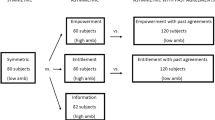Abstract
This paper explores gender differences in “make-up” and “suspicion” in a bargaining game in which the privately informed seller of a company sends a value message to the uninformed potential buyer who then proposes a price for the company. “Make-up” is measured by how much the true value is overstated, “suspicion” by how much the price offer differs from the value message. We run different computerized treatments varying in information about the gender (constellation) and in embeddedness of gender information. The asymmetry of the game and of information allows for a robust assessment of gender (constellation) effects. We report here the results from just one shot round decision since we expect such effects to be more pronounced for inexperienced participants. We mainly find an effect of gender constellation: when female sellers are aware to confront a female buyer, they overstate more, i.e. there is more “make-up”. However, we cannot confirm gender (constellation) effects for suspicion.
Similar content being viewed by others
Notes
This step of the decision process resembles an ultimatum game. Therefore, our findings can be compared to the results of gender differences in that framework.
After reading the instructions (available from the authors upon request), participants had to answer a few control questions before the experiment started.
What this neglets is a direct effect of the parameter \(q\) and the value \(v\), which together determine the surplus from trade, as well as of \(\widehat{v} \). We also checked the direct effect of \(q\) and \(v\) and the results do not change.
This result is quite in contrast to the finding of García-Gallego et al. (2012) in a field experiment.
According to our data, risk attitude does not affect the results.
References
Alesina, A., & La Ferrara, E. (2002). Who trusts others? Journal of Public Economics, 85(2), 207–234.
Ayres, I., & Siegelman, P. (1995). Race and gender discrimination in bargaining for a new car. American Economic Review, 85(3), 304–321.
Buss, D. M. (Ed.). (2005). The handbook of evolutionary psycology. Hoboken: Wiley.
Di Cagno, D., Galliera, A., Güth, W., Pace, N., & Panaccione, L. (2015). Experience and gender effects in an acquiring-a-company experiment allowing for value messages. Princeton: Mimeo.
Eagly, A. H., & Wood, W. (1999). The origins of sex differences in human behavior: Evolved dispositions versus social roles. American Psychologist, 54, 408–423.
Eckel, C. C., & Grossman, P. J. (2001). Chivalry and solidarity in ultimatum games. Economic Inquiry, 39(2), 171–188.
Eckel, C. C., & Grossman, P. J. (2008). Differences in the economic decisions of men and women: Experimental evidence (Ch. 113). In C. Plott & V. Smith (Eds.), Handbook of experimental economics results (pp. 1061–1073). New York: Elsevier.
Fischbacher, U. (2007). z-Tree: Zurich toolbox for ready-made economic experiments. Experimental Economics, 10(2), 171–178.
García-Gallego, A., Georgantzís, N., & Jaramillo-Gutiérrez, A. (2012). Gender differences in ultimatum games: Despite rather than due to risk attitudes. Journal of Economic Behavior & Organization, 83(1), 42–49.
Gneezy, U., & Rustichini, A. (2004). Gender and competition at a young age. American Economic Review, 94(2), 377–381.
Greiner, B. (2004). The online recruitment system orsee 2.0-a guide for the organization of experiments in economics, University of Cologne. Working Paper Series in Economics, 10(23), 63–104.
Güth, W., Pull K., Stadler, M., & Zaby A. (2014). Compulsory disclosure of private information: Theoretical and experimental results for the “Acquiring-a-Company” Game, In Jena Economic Research Paper 2014–003.
Kagel, J. H. (1995). Cross-game learning: Experimental evidence from first-price and English common value auctions. Economics Letters, 49(2), 163–170.
Niederle, M., & Vesterlund, L. (2007). Do women shy away from competition? Do men compete too much? The Quarterly Journal of Economics, 122(3), 1067–1101.
Riley, B.H., & McGinn, K.L. (2002). When does gender matter in negotiation? Working Paper Series rwp02-036, Harvard University, John F. Kennedy School of Government.
Saad, G., & Tripat, G. (2001). Sex differences in the ultimatum game: An evolutionary psychology perspective. Journal of Bioeconomics, 3(2), 171–193.
Samuelson, W.F., & Bazerman, M. H. (1985). Negotiation under the winner’s curse. In Smith, V. (Ed.) Research in experimental economics, Vol. III.
Solnick, S. J. (2001). Gender differences in the ultimatum game. Economic Inquiry, 39(2), 189–200.
Sutter, M., Bosman, R., Kocher, M., & Winden, F. (2009). Gender pairing and bargaining-Beware the same sex!. Experimental Economics, 12(3), 318–331.
Thaler, R. (1988). Anomalies: The winner’s curse. The Journal of Economic Perspectives, 2(1), 191–202.
Acknowledgments
We would like to thank the Max Planck Institute of Jena for funding and supporting this research.
Conflict of interest
The authors declare that there are no conflicts of interest.
Author information
Authors and Affiliations
Corresponding author
Rights and permissions
About this article
Cite this article
Di Cagno, D., Galliera, A., Güth, W. et al. Make-up and suspicion in bargaining with cheap talk: An experiment controlling for gender and gender constellation. Theory Decis 80, 463–471 (2016). https://doi.org/10.1007/s11238-015-9497-9
Published:
Issue Date:
DOI: https://doi.org/10.1007/s11238-015-9497-9




